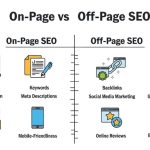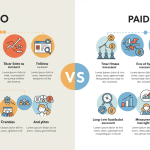
Search engine optimization might sound like tech jargon, but it’s actually one of the most powerful tools for growing your online presence. Whether you run a small business, write a blog, or manage a large website, understanding SEO can transform how people discover your content.
At its core, SEO is about making your website more visible when people search for information, products, or services related to your business. But there’s much more to it than simply stuffing keywords into your content. This guide will break down everything you need to know about SEO, from basic concepts to practical strategies you can implement right away.
Understanding SEO: The Basics
SEO stands for Search Engine Optimization. It’s the practice of optimizing your website to rank higher in search engine results pages (SERPs) when people search for relevant terms. The goal is simple: get more people to find and visit your website through organic (non-paid) search results.
Search engines like Google use complex algorithms to determine which websites should appear first when someone searches for a specific term. These algorithms consider hundreds of factors, including the relevance of your content, the quality of your website, and how other sites link to yours.
Think of SEO as a way to communicate with search engines. You’re essentially telling them what your website is about and why it deserves to be shown to searchers. The better you communicate this, the more likely you are to rank well.
Why SEO Matters for Your Business

SEO isn’t just about getting more website visitors—it’s about getting the right visitors. When someone searches for information related to your business, they’re already showing interest in what you offer. By ranking well for relevant searches, you can connect with potential customers at the exact moment they’re looking for solutions.
The benefits of effective SEO extend far beyond increased traffic. Higher search rankings build credibility and trust with your audience. Studies show that people are more likely to click on websites that appear at the top of search results, viewing them as more authoritative and trustworthy.
SEO also provides excellent long-term value. Unlike paid advertising, which stops generating results the moment you stop paying, SEO can continue driving traffic to your website for months or even years after you’ve optimized your content.
How to Choose the Right SEO Services for Your Small Business
As a small business owner, diving into SEO can feel overwhelming. While the concepts are clear, implementing them effectively requires expertise and time. That’s where professional SEO services come in. But how do you choose the right SEO services for your business? Below are some factors to consider when selecting the right SEO partner:
Key Factors to Consider:
- Experience with Small Businesses
Look for an SEO service provider that has a track record of working with businesses similar to yours. They’ll better understand the unique challenges and opportunities for small businesses. - Customization of Services
A one-size-fits-all SEO strategy may not work. Ensure that the service provider offers tailored SEO solutions designed specifically for your industry and target audience. - Transparency and Reporting
Choose an SEO company that offers transparent reporting on the progress of your SEO campaigns. They should provide clear insights into the effectiveness of their strategies, so you can track performance. - Local SEO Expertise
For small businesses, local SEO is essential. Your SEO provider should be proficient in optimizing your online presence for location-based searches, especially if you serve a specific geographic area. - SEO Experience & Reputation
Investigate the provider’s reputation by reading reviews, asking for case studies, and requesting client referrals. You want to ensure you’re working with a trusted expert.
How SEO Services Benefit Small Businesses:
Increased Organic Traffic
More visibility in search results translates into more visitors to your website.
Improved Brand Credibility
Higher rankings can build trust, as users tend to trust websites that appear at the top of search results.
Cost-Effective Marketing
Unlike paid ads, SEO results don’t disappear as soon as you stop paying. SEO helps create long-lasting organic traffic.
How Search Engines Work
Understanding how search engines operate helps you create better SEO strategies. Search engines use automated programs called crawlers or spiders to discover and analyze web pages across the internet. These crawlers follow links from one page to another, building a massive database of web content.
Once a crawler finds your page, it goes through an indexing process. The search engine analyzes your content, images, and other elements to understand what your page is about. This information gets stored in the search engine’s index—essentially a giant library of web pages.
When someone performs a search, the search engine quickly scans its index to find the most relevant results. The algorithm considers factors like keyword relevance, content quality, page loading speed, and user experience to determine which pages should rank highest.
The Three Pillars of SEO
Effective SEO rests on three main pillars: on-page optimization, off-page optimization, and technical SEO. Each plays a crucial role in helping search engines understand and rank your website.
On-Page SEO: Optimizing Your Content

On-page SEO focuses on elements you can directly control on your website. This includes your content, headings, meta descriptions, and internal linking structure.
Content remains the foundation of on-page SEO. Search engines want to show users high-quality, relevant content that answers their questions. This means creating comprehensive, well-written articles, product descriptions, and other content that provides genuine value to your audience.
Keywords play an important role in on-page SEO, but they need to be used strategically. Rather than cramming keywords into every sentence, focus on creating natural, readable content that incorporates relevant terms where they make sense. Include keywords in important places like your title tag, headings, and meta description.
Your page structure also matters. Use clear headings to organize your content and make it easy for both users and search engines to understand. Include internal links to other relevant pages on your website, which helps search engines discover more of your content and keeps visitors engaged.
Off-Page SEO: Building Authority
Off-page SEO involves activities that happen outside your website but impact your search rankings. The most important off-page factor is link building—earning links from other websites to yours.
Search engines view links as votes of confidence. When reputable websites link to your content, it signals that your information is valuable and trustworthy. However, not all links are created equal. A single link from a high-authority website in your industry can be more valuable than dozens of links from low-quality sites.
Building high-quality links takes time and effort. Focus on creating content that other websites want to reference and share. This might include original research, comprehensive guides, or unique insights that add value to your industry’s conversation.
Social media activity and online mentions also contribute to off-page SEO. While social signals don’t directly impact rankings, they can increase your content’s visibility and lead to more natural links and traffic.
Technical SEO: The Foundation
Technical SEO ensures that search engines can easily crawl, index, and understand your website. This includes factors like site speed, mobile responsiveness, and website structure.
Page loading speed has become increasingly important for SEO. Slow-loading pages frustrate users and can negatively impact your search rankings. Optimize your images, minimize code, and choose reliable hosting to improve your site’s speed.
Mobile optimization is no longer optional. Most web searches now happen on mobile devices, and search engines prioritize mobile-friendly websites. Ensure your site looks and functions well on smartphones and tablets.
Your website’s structure and navigation also affect technical SEO. Create a logical hierarchy with clear categories and subcategories. Use descriptive URLs that include relevant keywords, and make sure all important pages are easily accessible through your navigation menu.
SEO Best Practices for Beginners

Getting started with SEO doesn’t require technical expertise. Begin with keyword research to understand what terms your target audience searches for. Free tools like Google’s Keyword Planner can help you identify relevant keywords with good search volume.
Focus on creating high-quality content that addresses your audience’s needs and questions. Write comprehensive articles that cover topics thoroughly rather than producing lots of shallow content. Quality beats quantity when it comes to SEO.
Optimize your page titles and meta descriptions for each page. These elements appear in search results and can significantly impact whether people click through to your website. Make them descriptive and compelling while including relevant keywords.
Don’t forget about local SEO if you have a physical business location. Claim your Google My Business listing and encourage satisfied customers to leave reviews. Include your location and contact information consistently across your website and other online profiles.
Common SEO Mistakes to Avoid
Many beginners make the mistake of focusing too heavily on keyword density—the percentage of times a keyword appears in their content. Modern search algorithms are sophisticated enough to understand context and meaning, so prioritize natural, readable content over keyword stuffing.
Avoid buying low-quality links or participating in link schemes. These tactics might provide short-term gains, but they can result in penalties that severely damage your search rankings. Focus on earning high-quality links through great content and genuine relationship building.
Don’t ignore your website’s user experience. Search engines increasingly consider factors like bounce rate, time on page, and overall user satisfaction when determining rankings. A well-designed, fast-loading website that provides value to visitors will naturally perform better in search results.
Measuring SEO Success

SEO is a long-term strategy that requires patience and consistent effort. Use tools like Google Analytics and Google Search Console to track your progress. Monitor metrics like organic traffic, search rankings, and click-through rates to understand how your SEO efforts are performing.
Set realistic expectations for your SEO timeline. While some improvements might be visible within a few weeks, significant ranking improvements typically take several months. Focus on creating valuable content and optimizing your website consistently rather than expecting overnight results.
Creating Content That Search Engines Understand
Search engines prioritize content that clearly answers user intent and provides meaningful value. To optimize your website for long-term growth, content should be structured logically and written for humans first. Using semantic SEO techniques helps search engines interpret the context of your content, not just individual words. This improves your chances of ranking for related and conversational search queries. A clear understanding of on-page vs off-page SEO is also essential, as content relevance must be supported by authority signals like backlinks and mentions. When your content strategy balances clarity, relevance, and authority, it becomes easier for search engines to trust and rank your pages consistently over time.
Strengthening Website Visibility Over Time
Improving visibility in search results requires consistency and strategic planning. Businesses that optimize your website with user-focused design and valuable content tend to perform better in competitive search environments. Semantic SEO plays a key role by helping search engines recognize topic depth and relevance across multiple pages. Instead of targeting a single keyword, this approach supports broader ranking potential. At the same time, understanding on-page vs off-page SEO ensures that technical structure and external authority work together. When these elements are aligned, your website gains stronger visibility, attracts qualified traffic, and builds a foundation for sustainable organic growth.
Aligning SEO With User Intent
Successful SEO strategies focus on matching content with what users are actually searching for. When you optimize your website based on search intent, you improve engagement and reduce bounce rates. Semantic SEO helps bridge the gap between keywords and meaning, allowing your content to appear for variations of a search query. This approach works best when combined with a balanced understanding of on-page vs off-page SEO, where content quality is supported by trust signals like backlinks. By aligning intent, relevance, and authority, your website becomes more useful to users and more attractive to search engines.
Advanced SEO Strategies for Modern Websites
As the digital landscape evolves, understanding advanced SEO techniques can help your website stay ahead of the competition. Beyond basic optimization, businesses need to consider specialized areas like cybersecurity SEO, voice search SEO, and tailored strategies for smaller enterprises.
Key Advanced SEO Areas:
- Cybersecurity SEO: Ensuring your website is secure (HTTPS, SSL certificates, and safe user interactions) is not only critical for protecting visitors but also affects rankings. Search engines favor websites that provide a secure and trustworthy experience.
- Voice Search SEO: With the rise of smart assistants like Siri, Alexa, and Google Assistant, optimizing content for voice queries is increasingly important. Focus on natural language, question-based content, and concise answers to capture voice search traffic.
- SEO Services for Small Business: Smaller companies benefit from specialized SEO services that focus on local search, niche keywords, and cost-effective strategies to compete with larger businesses.
Best Practices for Advanced SEO:
- Regularly audit website security and performance.
- Structure content with conversational keywords for voice search.
- Focus on local and niche optimization to maximize small business visibility.
- Create authoritative content to attract quality backlinks.
| Advanced SEO Strategy | Description | Benefit for Business |
|---|---|---|
| Cybersecurity SEO | Securing your website and protecting user data | Builds trust with users and search engines |
| Voice Search SEO | Optimizing for natural, spoken queries | Captures growing voice search traffic |
| SEO Services for Small Business | Tailored optimization strategies for smaller enterprises | Improves local and niche visibility |
Measuring and Improving SEO ROI
Understanding how to measure SEO success is crucial for ensuring your efforts generate a positive return on investment (ROI). While traffic is an important metric, focusing on qualified visitors, conversions, and user engagement provides a more accurate picture of your SEO performance.
Steps to Measure and Improve SEO ROI:
- Track Organic Traffic: Monitor the number of visitors coming from search engines using tools like Google Analytics.
- Evaluate Keyword Rankings: Identify which keywords drive the most traffic and conversions. Adjust your content strategy based on performance.
- Measure Conversions: Track actions like form submissions, purchases, or newsletter sign-ups to understand SEO’s impact on revenue.
- Analyze User Engagement: Monitor metrics like bounce rate, session duration, and pages per visit to gauge content effectiveness.
- Optimize Continuously: Use insights to refine content, improve voice search SEO, strengthen links, and enhance technical aspects like site speed and mobile responsiveness.
| Metric | Tool / Method | Purpose |
|---|---|---|
| Organic Traffic | Google Analytics | Measures search engine-driven visitors |
| Keyword Performance | Google Search Console, SEMrush | Tracks which keywords rank and drive traffic |
| Conversions | Analytics / CRM | Assesses SEO impact on business goals |
| User Engagement | Google Analytics | Evaluates how users interact with content |
| Security & Technical Health | Site audits, cybersecurity checks | Ensures safe, accessible, and search-friendly site |
By focusing on ROI-driven SEO, businesses can ensure their efforts—whether through cybersecurity SEO, voice search optimization, or tailored SEO services for small business—deliver measurable results and sustainable growth.
Building Authority Through Consistency
Authority is built gradually through consistent optimization and value-driven content. To optimize your website effectively, every page should support a clear topic and purpose. Semantic SEO strengthens this process by connecting related ideas and reinforcing topical relevance across your site. Meanwhile, understanding on-page vs off-page SEO allows you to balance internal optimization with external credibility. High-quality content combined with strong authority signals improves rankings and user trust. Over time, this consistency helps your website establish a reliable presence in search results and maintain competitive performance within your industry.
Enhancing Search Performance Strategically
Search performance improves when technical structure and content strategy work together. Businesses that optimize your website with clear navigation and relevant content send strong signals to search engines. Semantic SEO enhances this by helping algorithms understand topic relationships and depth. Rather than relying on exact-match keywords, this method supports broader ranking opportunities. A solid understanding of on-page vs off-page SEO further ensures that internal optimization efforts are reinforced by external validation. When these strategies are applied together, websites experience improved rankings, stronger engagement, and more stable organic traffic growth.
Creating Long-Term SEO Value
Long-term SEO success depends on adaptability and quality. When you optimize your website with future-focused strategies, you reduce reliance on short-term tactics. Semantic SEO supports long-term value by ensuring your content remains relevant even as search behavior evolves. Additionally, understanding on-page vs off-page SEO helps maintain balance between content improvements and authority-building efforts. This combination allows your website to remain competitive, trustworthy, and discoverable. Over time, consistent optimization leads to stronger rankings, better user experience, and sustainable organic traffic that continues to deliver results.
Supporting Growth With Smarter Optimization
Growth-focused SEO requires more than basic keyword placement. To optimize your website effectively, strategies must focus on relevance, structure, and authority. Semantic SEO enhances content clarity by helping search engines understand meaning and context. When paired with a strong grasp of on-page vs off-page SEO, businesses can ensure their content is both well-optimized and well-supported externally. This integrated approach strengthens rankings, improves visibility, and supports long-term digital growth. As competition increases, smarter optimization becomes essential for maintaining consistent performance in search results.
Your SEO Journey Starts Now
SEO might seem overwhelming at first, but it’s essentially about creating a better experience for your website visitors while helping search engines understand your content. Start with the basics: create high-quality content, optimize your page titles and descriptions, and ensure your website loads quickly and works well on mobile devices.
Remember that SEO is an ongoing process, not a one-time task. Search engines constantly update their algorithms, and your competitors are working to improve their rankings too. Stay informed about SEO best practices and continue refining your strategy as you learn what works best for your specific audience and industry.
Begin implementing these SEO fundamentals today, and you’ll be well on your way to improving your website’s visibility and attracting more qualified visitors through search engines.
Frequently Asked Questions (FAQ)
1. What is SEO in simple terms?
SEO is the process of improving a website so it appears higher in search engine results and attracts organic visitors.
2. Why is SEO important for websites?
SEO helps bring targeted traffic, increases online visibility, and builds long-term credibility without relying only on paid ads.
3. How long does it take to see SEO results?
SEO usually takes a few months to show strong results, depending on competition, content quality, and consistency.
4. Can beginners do SEO on their own?
Yes. Basic SEO like content optimization, keyword research, and improving page structure can be done without advanced technical skills.
5. What is on-page SEO?
On-page SEO focuses on optimizing content, headings, meta tags, and internal links within a website.
6. What is off-page SEO?
Off-page SEO involves activities outside the website, such as backlinks, brand mentions, and online authority building.
7. What is semantic SEO?
Semantic SEO focuses on content meaning and context, helping search engines understand topics rather than just keywords.
8. Does website speed affect SEO?
Yes. Faster websites provide better user experience and are more likely to rank higher in search results.
9. Is mobile optimization necessary for SEO?
Absolutely. Search engines prioritize mobile-friendly websites because most searches happen on mobile devices.
10. Is SEO a one-time process?
No. SEO is an ongoing effort that requires regular updates, content improvements, and performance tracking.


















No Comments